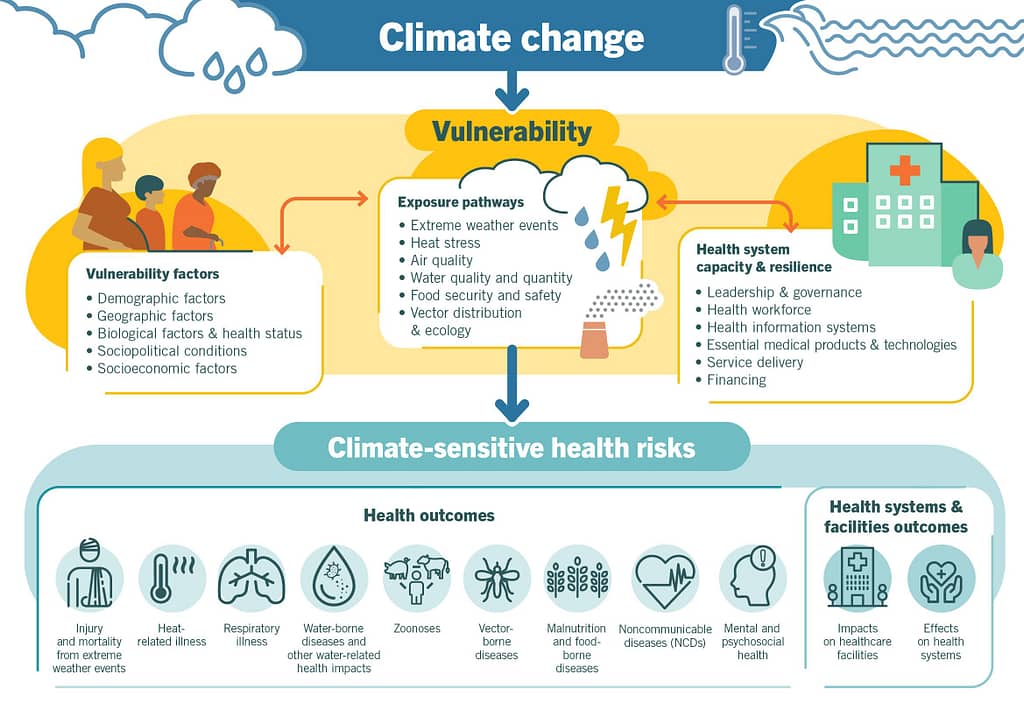Introduction into Climate Change
Climate change is one of the most pressing global challenges of our time, with far-reaching consequences for the planet and its inhabitants. Beyond the immediate environmental concerns, climate change poses a significant threat to human health. Rising temperatures, extreme weather events, changing disease patterns, and disruptions to ecosystems all contribute to a complex web of health risks. In this blog post, we will delve into the various ways climate change impacts human health and explore potential solutions to impact these effects.
Heat-Related Illnesses
As global temperatures continue to rise, heat-related illnesses are becoming more common. Heatwaves are more frequent and intense, leading to conditions like heat exhaustion and heatstroke. Vulnerable populations, such as the elderly, children, and those with preexisting health conditions, are particularly at risk. Additionally, higher temperatures can worsen chronic conditions like cardiovascular diseases and respiratory illnesses.
Respiratory Problems
Climate change contributes to poor air quality, which can exacerbate respiratory problems like asthma and allergies. Increased temperatures and prolonged pollen seasons can lead to more allergenic pollen, triggering allergic reactions in many individuals. Furthermore, wildfires, which are exacerbated by climate change, release harmful air pollutants that can cause acute respiratory issues.
Vector-Borne Diseases
Changes in temperature and precipitation patterns influence the distribution and behavior of disease-carrying vectors like mosquitoes and ticks. This has led to the expansion of diseases like malaria, dengue fever, and Lyme disease into new regions. The spread of these diseases places millions of people at risk, especially in areas that lack the infrastructure to combat these health threats.
Waterborne Diseases
Extreme weather events, such as heavy rainfall and flooding, can contaminate water sources, leading to outbreaks of waterborne diseases like cholera and dysentery. The displacement of communities due to climate-related disasters also increases the risk of disease transmission in overcrowded and unsanitary conditions.
Mental Health Impacts
Climate change can have profound effects on mental health. The stress and trauma associated with extreme weather events, loss of livelihoods, and displacement can lead to anxiety, depression, and post-traumatic stress disorder. Vulnerable communities, including indigenous populations and low-income groups, often bear the brunt of these mental health challenges.
Food and Nutrition Insecurity
Climate change disrupts food production by causing crop failures, reducing agricultural yields, and altering the nutritional content of food. This can result in food shortages and higher prices, leading to malnutrition and hunger, particularly in developing countries.

Mitigating the Impact
Addressing the impact of climate change on human health requires a multi-pronged approach:
- Reducing Greenhouse Gas Emissions: The primary driver of climate change is the emission of greenhouse gases. Transitioning to renewable energy sources, improving energy efficiency, and implementing sustainable transportation options can help reduce emissions.
- Adaptation and Resilience: Building resilient healthcare systems, infrastructure, and communities can help mitigate the health impacts of climate change. This includes early warning systems for extreme weather events and improved disaster preparedness.
- Public Health Interventions: Public health measures, such as vaccination campaigns, mosquito control programs, and improved access to clean water and sanitation, are essential to combating the spread of vector-borne and waterborne diseases.
- Mental Health Support: Recognizing and addressing the mental health impacts of climate change is crucial. Providing mental health resources and support to affected communities can help individuals cope with climate-related stressors.
- Promoting Sustainable Lifestyles: Encouraging sustainable practices in our daily lives, such as reducing waste, conserving water, and adopting eco-friendly transportation options, can collectively reduce our carbon footprint.
Conclusion
Climate change is not just an environmental issue; it is a pressing threat to human health and well-being. To protect ourselves and future generations, we must take concerted action to mitigate the impacts of climate change. By reducing greenhouse gas emissions, building resilience, and addressing the specific health challenges posed by a changing climate, we can work towards a healthier and more sustainable future for all.
